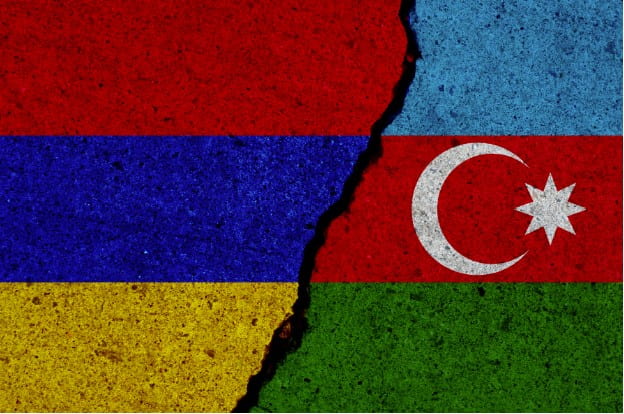Nearly six months since the end of the Third Karabakh War, tensions persist along the Armenia-Azerbaijan borders as both nations trade accusations. Discontent with Russia’s failure to protect Karabakh’s residents has prompted Armenia to reconsider its Collective Security Treaty Organization (CSTO) membership, raising the question of who could fill the void. Meanwhile, Azerbaijan continues strengthening its military, expressing concern over Armenia’s armament. The debate over Armenia’s coat of arms and anthem further complicates the situation, with Turkey and Azerbaijan questioning the symbolism. Amidst these uncertainties, the region grapples with the future, the potential for peace, and the risk of further conflict.
What is the future of the region? What role should the US and western European countries play in preventing another outbreak of violence in the region? Is a renewed war still possible? Why are the Armenian Coat of Arms and its anthem irritating Azerbaijan? Should the Russians leave the region, and if so, who might substitute for them?
SPEAKERS
Ann L. Phillips, PhD, is a scholar-practitioner with decades-long experience researching and teaching at US and European universities about system transitions in the former Soviet Union, complemented by practitioner work for USAID, The George C. Marshall Center for European Security, and the US Institute of Peace on assistance to conflict-affected and fragile states in the region. She is currently a Fellow at the Center for Peacemaking Practice, Jimmy and Rosalynn Carter School for Peace and Conflict Resolution at George Mason University in Arlington, Virginia.
Alexander Iskandaryan is a prominent expert on politics, nationalism, and the contemporary history of Armenia, the South Caucasus, and Eurasia. He is a political scientist and the Director of the Caucasus Institute in Yerevan, Armenia. He has authored numerous works on these topics, presented papers, and has talked at numerous conferences.
Ahmad Alili is a researcher in international public policy and regional security of the South Caucasus, the Eastern Partnership countries, and neighboring regional powers. He is part of several peacebuilding initiatives supported by the EU, UN, and Partnership for Peace Consortium. Currently, he is the director of the Caucasus Policy Analysis Centre (CPAC), a Baku-based independent think tank promoting regional integration in the South Caucasus. He is also a lecturer at the Academy of Public Administration on the role of nonstate actors in regional security, geopolitics, public management, and good governance.
MODERATOR
Mikail Mamedov holds a PhD in History from Georgetown University, where he is also a Lecturer in History and the Liberal Studies Program of the School of Continuing Studies. His multiethnic Azeri-Armenian family arrived in the US back in 1996, in the wake of the outbreak of the Karabakh conflict. He holds an MA from The George Washington University and a Diploma in History from Moscow Lomonosov State University. He has authored numerous articles on the history of the Caucasus, and on contemporary literature and the Karabakh conflict.

